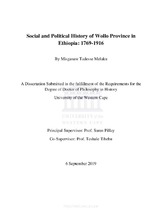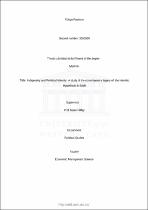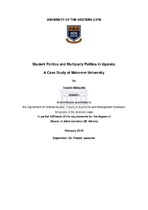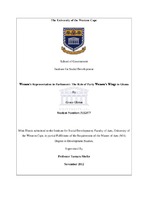| dc.description.abstract | Wollo, formerly referred to as ―Bete Amhara,‖ refers to a region of Amharic-speaking Christians. It was one of the oldest provinces of Ethiopia; located in the north-eastern part of Ethiopia at the cross- roads of the Red Sea, Gulf of Aden, Sudan, and central and Southern Ethiopia. Its geostrategic central position has made it a historical focal point of historical dynamics in Ethiopia. Due to its geostrategic position, many writers of the medieval period referred to Wollo as the ―center and the heartland of the Abyssinian Empire. On account of these, major historical battles among political, social, and religious forces occurred in this region leaving their own mark on it and the nature of the Ethiopian state.
Before the sixteenth century, Wollo had been a center of history, political administration, religion, and religious education. As a result, numerous historical events have taken place in this province. Due to such factors, it was part of the historically dominant regions in Ethiopia. However, after the sixteenth century we see a decline in the position of Wollo. A province which was part of the center, afterwards the sixteenth century, had been downgraded to the periphery following its domination by Islam and Oromo, which were two subjects of marginalization in Ethiopian historiography. Thereafter, the province was relegated from the country‘s political ground and historical narration due to ethnic, religious, and political backgrounds.
In the earliest recordings of the historically dominant groups of Ethiopia, Wollo was not properly represented as it was regarded as a Muslim and Oromo province. In much of the recently recorded literature on the subaltern groups in the post-1991 period, the internal events of Wollo have been ignored.
Therefore, both in the past and recently, the socio-political history of Wollo province has never been given due regard. Despite the fact that Wollo bears elements of both the historically dominant and historical subaltern of Ethiopia, it has not been provided proper representation by the narrative of the historically dominant groups, as it is not given proper place in the emergent history of the subaltern in Post-1991 Ethiopia. This paradox of Wollo belonging to both but not given due attention and representation is the corridor leading to explore the dark sides of Ethiopian historiography.
Thus, this study attempts to examine why, how and in what way Wollo has been neglected from the country‘s political ground and historical narration. It will also try to reconstruct the social and political history of the province in the period under study. | en_US |




